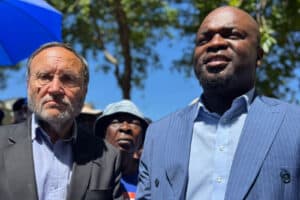Tshwane's problems are an illustration of how Msimanga's administration kowtowed to the red berets to stay in power.

The City of Tshwane’s DA mayor, Solly Msimanga, resigned from office on Friday, saying he wants to focus on his role as the party’s candidate for the Gauteng premiership in the upcoming national and provincial elections.
Msimanga has been leading a multiparty government in the City of Tshwane since 2016. In the municipal elections that year, no party secured a majority and the DA at national level came to an agreement with the United Democratic Movement (UDM), Congress of the People (Cope), Freedom Front Plus (FF+) and the African Christian Democratic Party (ACDP). The Economic Freedom Fighters (EFF) at that stage said it would vote with the DA, permitted the budget was pro-poor.
That the role of the EFF as kingmaker was crucial would become very clear.
In Tshwane the DA moved into government and expectations were high. Top of the agenda was the irregular smart meter contract with PEU Capital Partners that was central in the DA’s pre-election criticism of the ANC. Even the ANC earlier admitted that it was unaffordable at about R4 million per day.
Moneyweb reported last week that the DA-led city is still merrily paying PEU millions every day, despite a court order in October last year clearing the way for the city to show the supplier the door and stop the financial haemorrhaging.
Read: Paralysed DA-led Tshwane still merrily paying PEU millions
This the party blamed on the administration. It has in fact increasingly tried to distance itself from the administration as questionable decisions have come to light, saying councillors are not allowed to get involved in the administration.
Party leaders further often voice frustration with unresponsive officials whom they consider to be ANC deployees and are in their view sabotaging the DA-led city government.
Msimanga and Dr Moeketsi Mosola, the city manager he appointed, are at loggerheads. Mosola had political ties with Agang SA and no local government experience when he took the position.
Msimanga has since tried to suspend Mosola from his role in the irregular GladAfrica tender, but the ANC and EFF joined forces in the Tshwane council to block this suspension. Generally speaking, it is the responsibility of the municipal council as the employer to ensure that the city manager complies with his contractual obligations and other applicable legal duties.
It seems, however, that the DA-led city government is at the mercy of the EFF and powerless to root out corruption and maladministration among ANC-aligned officials.
‘Not without recourse’
University of Pretoria public law professor Bernard Bekink says that while the city manager, in terms of local government legislation, has overall accountability for the administration and any decision to hold him to account resides with the council in accordance with his employment contract, the DA is not without recourse where it seems political meddling may be preventing it from holding its city manager to account.
If Mosola acts unlawfully by doing something in contravention of the law or his employment contract, the mayor, his party or any other person or entity with an interest could, for example, approach a court for an order to stop such conduct.
He says that while a court would not normally interfere in the political sphere it could set aside the decision of the Tshwane council not to suspend Mosola if that decision is found to be irrational. The decision would then be remitted back to the council.
The DA has been quick to run to court in so many instances, yet in Tshwane it seems to be paralysed.
Bekink says that if the administration is not functioning properly, there is in fact an obligation for the DA to intervene, or risk intervention by the ANC-led provincial or national government.
Political analyst Professor Steven Friedman says it was curious that the EFF supported the DA to get into government in Tshwane and Johannesburg, without getting anything in return.
He adds that it has, however, become clear that the EFF in Johannesburg and Pretoria gave support to DA minorities because it got control of tender processes.
He points out that the DA in Tshwane can of course act against Mosola and the administration, but it cannot do so and remain in power at the same time.
It is problematic if the agreements among minority parties are not transparent to voters, Friedman says. It could result in a situation where the electorate does not get better service because of such agreements, which are more about dividing the cake.
DA credibility
Friedman says there is an impression that a DA government necessarily comes with more efficiency, but the 95% of voters in metropolitan suburbs who vote for the DA could become disillusioned as the DA loses credibility.
They will, however, keep on voting DA as they see no viable alternative.
The picture is clearly more complex than many people think. There isn’t only one good party and one bad party, Friedman says.
Why is the DA in Tshwane getting away with its failure to take accountability for the acts and omissions of its administration? Friedman says it is simple. There is just not enough pressure on the party to do so. “Politicians respond to pressure.”
It will be interesting to see if Mosola stays on. Or was there a deal for both to go?
The question for the DA’s Gauteng premiership candidate is how he will deal with a repeat of the Tshwane situation.
If no party gets a majority in the upcoming provincial election, will he get into bed with the EFF again? At what price? And will he take responsibility for an administration filled with ANC cadres?
Tshwane might come back to haunt him.
Brought to you by Moneyweb






